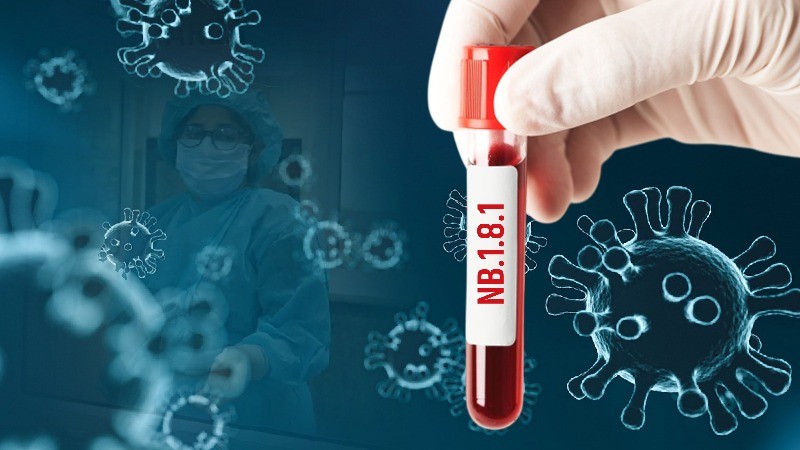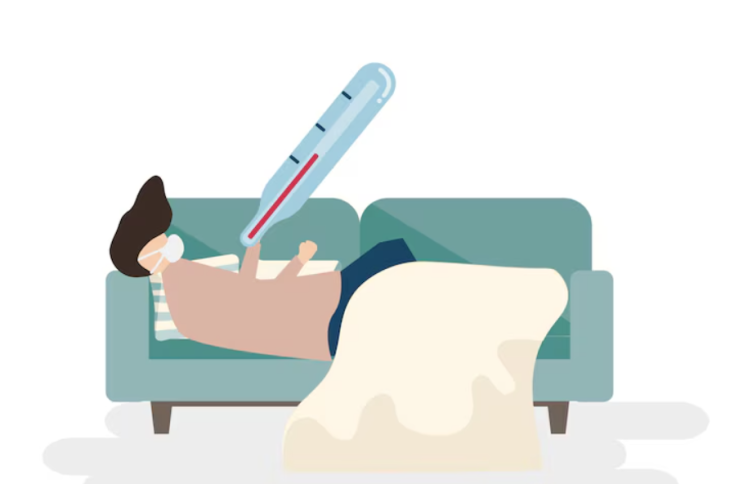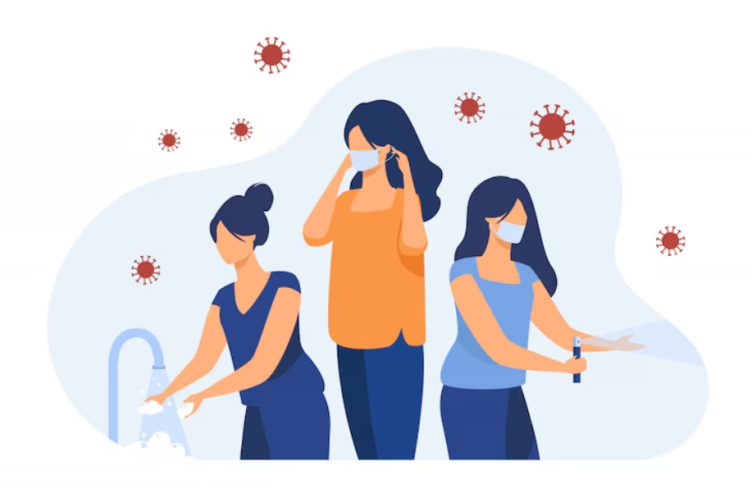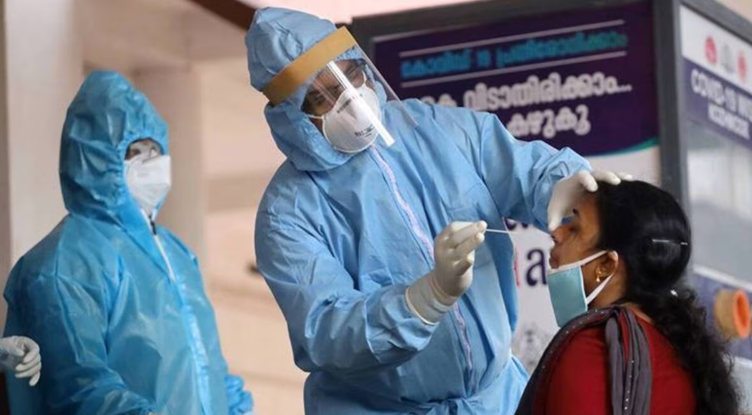
After a challenging pandemic era in 2020 and 2021, followed by Omicron wave among others, COVID-19 is making headlines globally, with its new active variant NB.1.8.1. There has been a recent surge in cases reported across Asia, mainly in Singapore and Hong Kong, with new detections in the United States at major airports in California, New York, Virginia, and Washington. Health authorities worldwide are closely monitoring the rise in cases and how the spread of the virus can be combated. But is it all so disastrous and worrying? Read on...
The NB.1.8.1 is a variant, basically protein mutations of JN.1, which is a lineage of the Omicron virus. Like other COVID-19 variants, NB.1.8.1 was identified first in China, from where it spread to different parts of Asia, and significantly around the world. NB.1.8.1 is now a Variant Under Monitoring (VUM), as declared by the World Health Organization (WHO) in its press release. It said, "NB1.8.1 has been designated a SARS-CoV-2 variant under monitoring (VUM) with increasing proportions globally."
"NB1.8.1 is a SARS-CoV-2 variant derived from the recombinant variant XDV.1.5.1, with the earliest sample collected on 22 January 2025. NB.1.8.1 is one of six VUMs tracked by the WHO and was designated as a VUM on 23 May 2025."
 Do not ignore the symptoms, you might be suffering from NB.1.8.1 variant (Image source: Freepik)
Do not ignore the symptoms, you might be suffering from NB.1.8.1 variant (Image source: Freepik)As far as now, NB.1.8.1 is very similar to the previously detected Omicron variants. The most common Symptoms include:
Nasal congestion
Fever, chills, and fatigue
Mild Cough
Muscle aches
Sore throat
Low-grade hypothermia: There have been some cases reported wherein people are experiencing low-grade hypothermia, which persists for a long time. It is when the body temperature is between 95°F and 89.6°F, different from the usual fever, and due to failed thermoregulation. You may feel exhausted, sleepy, have a fast heart rate and breathing, shiver, and experience excessive urination. That's when you should consult a doctor, before the mild hypothermia turns severe.
Other symptoms can be: Frequent headaches, nausea, vomiting, change in taste, gastrointestinal issues, and a loss of appetite.
Despite being consistent with other omicron variants, the NB.1.8.1 has varied differences. Firstly, it has a higher transmission rate in comparison to some other early variants. According to preliminary data available, NB.1.8.1 binds to human cells, leading to higher infection rates. It can spread easily and might undermine continuous surveillance and the effectiveness of public health systems.
NB.1.8.1 can easily escape antibodies or the immune defense developed through vaccines or past infections, that's why it requires prioritized attention and constant monitoring.
According to WHO, NB.1.8.1 poses a low global health risk. It said, "Despite a concurrent increase in cases and hospitalisation in some countries, where NB.1.8.1 is widespread, current data do not indicate that this variant leads to more severe illness than other variants in circulation."
We should not worry, but must take the necessary precautions and stay safe, ensuring that the virus doesn't spread further because of our carelessness. Therefore, in order to protect yourself and others.
 Practice safe hygiene, social distancing, and mask covering on your face to prevent the spread of any COVID-related infection (Image source: Freepik)
Practice safe hygiene, social distancing, and mask covering on your face to prevent the spread of any COVID-related infection (Image source: Freepik)
Wear masks, or keep your nose and mouth covered, whenever in crowded places or an enclosed environment. But keep physical distance as much as you can.
Wash your hands regularly, every once in a while, with soap or handwash for 20-30 seconds. Keep a sanitizer handy always. And do not share your items like masks, handkerchiefs, water bottles, etc.
Keep your face covered while coughing or sneezing. Do not touch your face without clean or washed hands.
Also, keep frequently touched surfaces as clean and hygienic as you can. Or clean your hands if you come in contact with them.
Avoid contact with sick people. If by any chance, you feel the same, stay at home. Get vaccinated and consult your physician.
Follow up on the health guidelines and advisories issued by the authorities. Keep your health in check. If you develop any symptoms, such as difficulty in breathing, constant pain in the chest, a pale or blue color of nail beds or skin, or fatigue that prevents you from staying awake,
Get tested (with a rapid antigen home test or an RT-PCR) and isolate yourself as soon as you can.
During such sensitive times, there are various social media posts circulating false information. Make sure to fact-check the information. Until very recently, a social media post claimed that Singapore had performed an autopsy on a COVID-19 patient, becoming the first country to do so. Also, finding out that COVID-19 is caused by a bacterium, not a virus. All of these claims are false and have been clarified by Singapore's Ministry of Health long ago in 2021. Even the WHO says that COVID-19 is caused by a virus, it belongs to the Coronaviridae family.
Therefore, do not fall into this trap. Do not consume such content, nor share it with others. Also, urge people to first fact-check, then only trust and share it with others.
Do not panic in such a situation; keep calm. Patience is the key to saving yourself as well as others around you.
 If COVID cases continue to rise, frequent and random testing might follow in India
If COVID cases continue to rise, frequent and random testing might follow in India
There has been a spike in COVID-19 cases in India lately, with NB.1.8.1 and LF.7 detected in the country. As of 03 June 2025, there are over 4000 active Coronavirus cases recorded in India. The fatalities stand at 37, while 2,700 people have recovered.
Health officials have stated that the situation is in control at present, and our healthcare systems are well prepared to deal with everything.
In the meantime, the existing vaccines are being monitored as to whether they prove effective against the new variants.
It is advised to take the necessary booster shot as a precautionary dose. Those who do not take their complete vaccination schedule are more susceptible to infection.
With rising infections and speculations added, it might seem that the situation is grim. But, it is not anything to panic or be frightened over the 'pandemic fuss'. Here is why:
As mentioned, the WHO has declared the new virus a Variant under Monitoring. Despite the increase in cases and hospitalizations, it is a low global health risk that does not lead to severe illnesses.
The spread and rise in cases in some countries also depend largely on immunity levels (whether you have taken the booster shot and vaccination to the latest), age groups, the seasonal patterns, the mutation of the variant, and testing and surveillance by healthcare professionals and Governments.
SARS-CoV-2 is not an emergency anymore, and won't disappear either. It is similar to the flu, part of the illness cycle of the world, very much endemic.
It seems nothing new, as COVID is very much a part and parcel of our lives now, with a new variant every now and then. But, it is important to ensure preparedness with advised precautions to stay safe. Follow the guidelines and do the necessary with vigilance, instead of panicking. COVID is endemic to the world, will stay for a while...